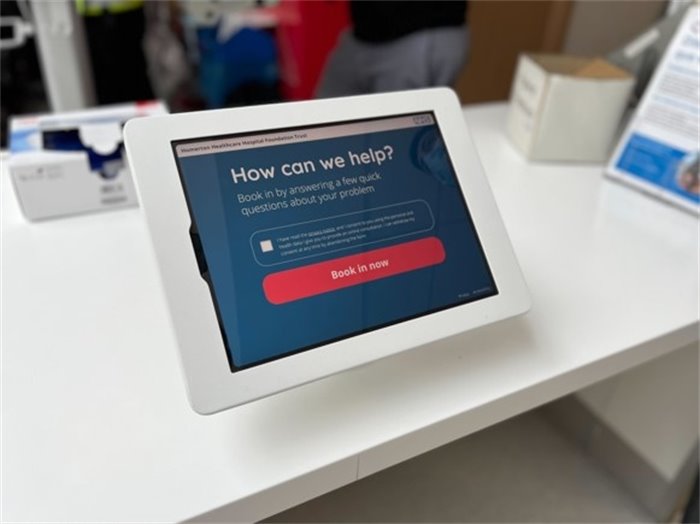Shadow Cabinet Office minister criticises government’s track record on cybersecurity
Credit: Pixabay
More than five years after Microsoft stopped providing support for Windows XP – and two years after the WannaCry cyberattack – the NHS still has more than 2,000 computers running on the operating system.
When WannaCry struck in May 2017, the NHS still ran 4.7% of its machines on XP, despite Microsoft having ceased support for the software back in 2014. Last year the government signed a £150m upgrade deal with the vendor, a key commitment of which was that the health service would update all its devices to Windows 10 by 14 January 2020 – the date at which support for Windows 7 ends.
But, in responding to a written parliamentary question from shadow Cabinet Office minister Jo Platt, the government revealed that 2,300 NHS computers are still running Windows XP.
Related content
- Next steps for UK cybersecurity: legislation; skills; and security by design
- ‘Like swimming in a pool of sharks’ – less than one in 4,000 Met Police PCs running latest version of Windows
- Almost half of councils using unsupported server software, FOI finds
Jackie Doyle-Price, minister for mental health, inequalities, and suicide prevention, said that the XP machines accounted for 0.16% of the NHS’s total estate of 1.4 million devices.
She added: “We are supporting NHS organisations to upgrade their existing Microsoft Windows operating systems, allowing them to reduce potential vulnerabilities and increase cyber-resilience.”
Platt said, two years on WannaCry, the continued presence of XP – which was released back in 2001 – is “an indictment of this government’s cybersecurity record”.
“The government is seriously lacking the leadership, strategy and co-ordination we need across the public sector to keep us and our data safe and secure. How many more warnings will it take before they listen and take action?,” she said. “The next Labour government will provide not only the resourcing but also the vital leadership, organisation and dedication needed to get our public sector fit and resilient to fight the cyber threats of the 21st century.”




Buy Leaked Only Fans ( Visit https://archiver.fans )
Buy Only Fans Leaks ( Visit https://archiver.fans )
Mega Link Store
Buy Fansly Leaks ( Visit https://archiver.fans )
Only Fans Leaks Updates
Lexi 2 Legit OnlyFans Mega Link Download
Lexi 2 Legit OnlyFans Mega Link Download
Free Only Fans Leaks ( Visit https://archiver.fans )
Itz Grippy TV OnlyFans Mega Link Download ( Visit https://archiver.fans )
Rebecca J OnlyFans Mega Link Download ( Visit https://archiver.fans )
Only Fans Leaks Free Download
Genesis Mia Lopez OnlyFans Mega Link Download
Genesis Mia Lopez OnlyFans Mega Link Download
Black Ass Jenny OnlyFans Mega Link Download
Lexi 2 Legit OnlyFans Mega Link Download
Corinna Kopf OnlyFans Mega Link Download ( Visit https://archiver.fans )
Mega Link Store
Mega Link Shop ( Visit https://archiver.fans )
North Natt OnlyFans Mega Link Download
Updated Only Fans Leaks ( Visit https://archiver.fans )
Corinna Kopf OnlyFans Mega Link Download ( Visit https://archiver.fans )
Mega Link Store
Jenise Hart OnlyFans Mega Link Download
Mega Link Shop ( Visit https://archiver.fans )
Yasmine Lopez OnlyFans Mega Link Download ( Visit https://archiver.fans )
Buy Leaked Content ( Visit https://archiver.fans )
Great beat ! I would like to apprentice while you amend your web site, how could i subscribe for a blog site? The account helped me a acceptable deal. I had been a little bit acquainted of this your broadcast provided bright clear concept
Bulma XO OnlyFans Mega Link Download
Gina WAP OnlyFans Mega Link Download ( Visit https://archiver.fans )
Thank you for your post. I really enjoyed reading it, especially because it addressed my issue. It helped me a lot and I hope it will also help others.
Thank you for being of assistance to me. I really loved this article.
Автор представляет информацию, основанную на исследованиях и экспертных мнениях.
Its Lunar Liv OnlyFans Mega Link Download
Buy Fansly Leaks ( Visit https://archiver.fans )
Bulma XO OnlyFans Mega Link Download
Daalischus Rose OnlyFans Mega Link Download
Free Only Fans Leaks ( Visit https://archiver.fans )
Gina WAP OnlyFans Mega Link Download ( Visit https://archiver.fans )
3TB Only Fans Mega
Genesis Mia Lopez OnlyFans Mega Link Download
Buy Leaked Only Fans ( Visit https://archiver.fans )
Thanks for your personal marvelous posting! I actually enjoyed reading it, you happen to be a great author.I will be sure to bookmark your blog and definitely will come back later in life. I want to encourage you continue your great posts, have a nice weekend!
Only Fans Leaks Mega Folders
Hot 4 Lexi OnlyFans Mega Link Download ( Visit https://archiver.fans )
Fansly Leaks Mega Link
WONDERFUL Post.thanks for share..extra wait .. ?
Lexi 2 Legit OnlyFans Mega Link Download
Buy Mega Links ( Visit https://archiver.fans )
Mulan Hernandez OnlyFans Mega Link Download ( Visit https://archiver.fans )
Hello there, just became alert to your blog through Google, and found that it is truly informative. I抦 gonna watch out for brussels. I will be grateful if you continue this in future. Numerous people will be benefited from your writing. Cheers!
Rebecca J OnlyFans Mega Link Download ( Visit https://archiver.fans )
Hot 4 Lexi OnlyFans Mega Link Download ( Visit https://archiver.fans )
8TB Only Fans Mega ( Visit https://archiver.fans )
GG With The WAP OnlyFans Mega Link Download
Updated Only Fans Leaks ( Visit https://archiver.fans )
Hola Bulma OnlyFans Mega Link Download ( Visit https://archiver.fans )
Im xXx Dark OnlyFans Mega Link Download ( Visit https://archiver.fans )
Mega Link Shop ( Visit https://archiver.fans )
Good blog post. What I would like to add is that personal computer memory needs to be purchased if the computer can’t cope with anything you do along with it. One can mount two random access memory boards containing 1GB each, in particular, but not certainly one of 1GB and one with 2GB. One should always check the manufacturer’s documentation for the PC to be sure what type of storage is required.
It抯 really a great and useful piece of info. I am glad that you shared this helpful information with us. Please keep us up to date like this. Thanks for sharing.
Hello there, just became alert to your blog through Google, and found that it is really informative. I am going to watch out for brussels. I抣l be grateful if you continue this in future. Many people will be benefited from your writing. Cheers!
TheRealRebeccaJ OnlyFans Mega Link Download
I am extremely impressed with your writing skills and also with the layout on your weblog. Is this a paid theme or did you customize it yourself? Either way keep up the excellent quality writing, it抯 rare to see a great blog like this one nowadays..
Hi there, just became aware of your blog through Google, and found that it’s truly informative. I抦 gonna watch out for brussels. I will appreciate if you continue this in future. A lot of people will be benefited from your writing. Cheers!
Daalischus Rose OnlyFans Mega Link Download
Updated Only Fans Leaks ( Visit https://archiver.fans )
Mega Link Shop ( Visit https://archiver.fans )
Itz Grippy TV OnlyFans Mega Link Download ( Visit https://archiver.fans )
Gina WAP OnlyFans Mega Link Download ( Visit https://archiver.fans )
Corinna Kopf OnlyFans Mega Link Download ( Visit https://archiver.fans )
Crii Baby RiRi OnlyFans Mega Link Download ( Visit https://archiver.fans )
Genesis Mia Lopez OnlyFans Mega Link Download
Jenise Hart OnlyFans Mega Link Download
3TB Only Fans Mega
Crii Baby RiRi OnlyFans Mega Link Download ( Visit https://archiver.fans )
Fansly Leaks Mega Link
fantastic points altogether, you just gained a brand new reader. What would you recommend about your post that you made some days ago? Any positive?
Mega Link Shop ( Visit https://archiver.fans )
Mulan Hernandez OnlyFans Mega Link Download ( Visit https://archiver.fans )
Itz Grippy TV OnlyFans Mega Link Download ( Visit https://archiver.fans )
Barely Legal Lexi OnlyFans Mega Link Download
Я оцениваю тщательность и точность, с которыми автор подошел к составлению этой статьи. Он привел надежные источники и представил информацию без преувеличений. Благодаря этому, я могу доверять ей как надежному источнику знаний.
I must show my thanks to the writer just for bailing me out of this difficulty. As a result of looking through the search engines and obtaining things that were not beneficial, I assumed my entire life was well over. Being alive devoid of the solutions to the difficulties you have sorted out by way of your good write-up is a crucial case, as well as the ones that might have in a wrong way affected my career if I hadn’t discovered your website. The capability and kindness in handling all the things was priceless. I’m not sure what I would’ve done if I had not discovered such a point like this. I can also at this time relish my future. Thanks so much for your impressive and effective help. I won’t hesitate to endorse the website to any person who needs and wants care about this problem.
Gina WAP OnlyFans Mega Link Download ( Visit https://archiver.fans )
Rubi Rose OnlyFans Mega Link Download
Itz Grippy TV OnlyFans Mega Link Download ( Visit https://archiver.fans )
Gina WAP OnlyFans Mega Link Download ( Visit https://archiver.fans )
Yasmine Lopez OnlyFans Mega Link Download ( Visit https://archiver.fans )
Thanks – Enjoyed this blog post, how can I make is so that I get an email when there is a new article?
Only Fans Leaks Updates
8TB Only Fans Mega ( Visit https://archiver.fans )
I’ve been absent for some time, but now I remember why I used to love this website. Thank you, I抣l try and check back more often. How frequently you update your web site?
North Natt OnlyFans Mega Link Download
Buy Leaked Content ( Visit https://archiver.fans )
Emmanuel Lustin OnlyFans Mega Link Download ( Visit https://archiver.fans )
3TB Only Fans Mega
Crii Baby RiRi OnlyFans Mega Link Download ( Visit https://archiver.fans )
Leah Mifsud OnlyFans Mega Link Download ( Visit https://archiver.fans )
Fansly Leaks Mega Link
Fansly Leaks Mega Link
Lexi 2 Legit OnlyFans Mega Link Download
Buy Fansly Leaks ( Visit https://archiver.fans )
Lexi 2 Legit OnlyFans Mega Link Download
8TB Only Fans Mega ( Visit https://archiver.fans )
Itz Grippy TV OnlyFans Mega Link Download ( Visit https://archiver.fans )
Black Ass Jenny OnlyFans Mega Link Download
Thanks for discussing your ideas in this article. The other thing is that each time a problem develops with a laptop motherboard, persons should not have some risk of repairing it themselves for if it is not done right it can lead to permanent damage to the whole laptop. It’s usually safe just to approach your dealer of a laptop with the repair of motherboard. They will have technicians who’ve an experience in dealing with laptop computer motherboard challenges and can get the right prognosis and carry out repairs.
Black Ass Jenny OnlyFans Mega Link Download
Mega Link Shop ( Visit https://archiver.fans )
8TB Only Fans Mega ( Visit https://archiver.fans )
Alexis Texas OnlyFans Leaks Mega Folder Link Download ( https://CrocSpot.Fun )
Tytiania Sargent OnlyFans Leaks ( https://urbancrocspot.org/the-real-bombshell-mint-only-fans-mega-link/ )
GinaWAP Only Fans Leaks ( https://urbancrocspot.org/gina-wap-gg-with-the-wap-only-fans-mega-link-9gb/ )
GinaWAP Free Only Fans https://urbancrocspot.org/tag/gg-with-the-wap/
TheThroatBully OnlyFans Leaks Mega Folder Link Download
BombshellMint ( https://UrbanCrocSpot.org/shop )
Red Rose La Cubana OnlyFans Leaks Mega Folder Link Download
Sammy02kVIP OnlyFans Leaks Mega Folder Link Download ( https://CrocSpot.Fun )
BombshellMint OnlyFans PPVs ( https://urbancrocspot.org/the-real-bombshell-mint-only-fans-mega-link/ )
GinaWAP Free Only Fans https://urbancrocspot.org/tag/gg-with-the-wap/
Tytiania Sargent Porn ( https://UrbanCrocSpot.org/shop )
The Real Bombshell Mint ( https://urbancrocspot.org/the-real-bombshell-mint-only-fans-mega-link/ )
GGWithTheWAP Only Fans PPVs ( https://urbancrocspot.org/gina-wap-gg-with-the-wap-only-fans-mega-link-9gb/ )
BombshellMint ( https://UrbanCrocSpot.org/shop )
GinaWAP Only Fans Leaks ( https://urbancrocspot.org/gina-wap-gg-with-the-wap-only-fans-mega-link-9gb/ )
GGWithTheWAP Only Fans Leaks https://urbancrocspot.org/product-tag/gg-with-the-wap/
BombshellMint ( https://UrbanCrocSpot.org/shop )
Tytiania Sargent Porn ( https://UrbanCrocSpot.org/shop )
¡Qué gran publicación! Tu contenido resalta por su profundidad y su impecable redacción. Es un agrado encontrar publicaciones tan cuidadas que ofrecen información valiosa. ¡Enhorabuena por tu trabajo!
https://doxbin.org/upload/JayceBradfordChildPredatorCPConnoisseur